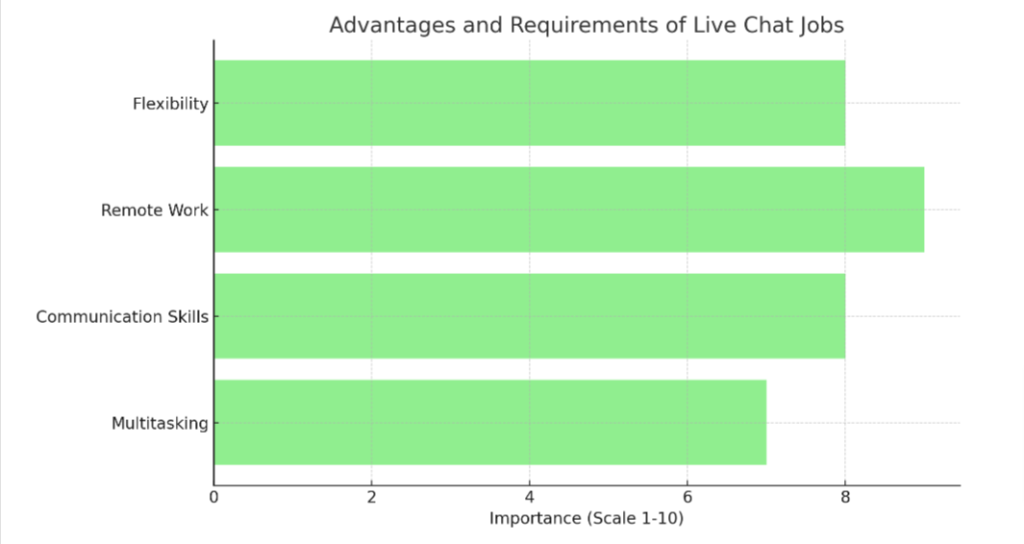Your First Steps in Finding Live Chat Jobs: Using Job Portals Effectively
Are you struggling to land a live chat support role in the remote job market? Live chat positions are rapidly expanding, with many companies seeking online customer service experts.
This guide will steer you through the maze of job portals and provide insider tips on clinching that live chat job. Get ready to transform your job hunt!
Key Takeaways
- Live chat jobs offer flexibility and the opportunity to work from anywhere, making them ideal for those who value a strong work-life balance.
- Job seekers can utilize specialized job portals and set up email alerts to find live chat support roles that match their skills and preferences.
- Crafting a tailored resume and cover letter is crucial for standing out in the application process, as well as preparing for virtual interviews by researching the company and role.
- Employees in live chat positions need to have excellent written communication skills, multitasking abilities, and be comfortable handling multiple conversations at once.
- Although there are many advantages to live chat jobs, such as flexible hours and remote work options, potential drawbacks include limited social interactions and sedentary working conditions.
What are Live Chat Jobs?
Live chat jobs involve providing customer support and assistance through online chat platforms. These positions offer the flexibility of remote work and the opportunity to communicate with customers in real-time.
Definition of Live Chat Jobs
Live chat jobs involve assisting customers through instant messaging platforms on a company’s website or social media channels. These roles require quick thinking and typing skills, as you’ll be expected to respond to customer inquiries in real-time.
Chat agents work to solve problems, provide information, and ensure a smooth customer experience without the delay of email or the pressure of phone calls.
Working as a chat support representative often means you have the flexibility of remote work opportunities, where your office can be anywhere with an internet connection. Your duties may include troubleshooting technical issues, guiding customers through purchases, or offering detailed product advice.
This field is perfect for those who excel at written communication and are looking for online chat operator jobs that offer both full-time and part-time options.
Benefits of Working in Live Chat Support
Live chat jobs offer unique advantages that other customer service roles might not. They blend the convenience of remote work with the satisfaction of helping people in real-time.
- Flexibility in work hours is a standout benefit, allowing you to fit your job around your personal schedule.
- Remote work opportunities with live chat positions mean cutting out the commute and working from the comfort of your home.
- Live chat support roles often come with comprehensive training, giving you valuable career development skills.
- You’ll gain communication expertise by engaging with a variety of customers daily, enhancing your problem-solving abilities.
- Chat agent positions offer a quieter work environment compared to phone support roles, reducing stress levels.
- Many online chat customer support jobs provide the chance to join supportive online communities, fostering teamwork even in remote settings.
- Virtual interviews make applying for these jobs more convenient than traditional interviews, saving you time and resources.
- Job opportunities in this field are growing rapidly as more businesses move their services online, increasing employment prospects.
- Salary and benefits for live chat positions are competitive, equating to or surpassing those of traditional retail customer service jobs.
- As a chat support specialist, you enjoy constant learning through diverse inquiries and technical situations that keep your day-to-day activities engaging.
How to Find and Apply for Live Chat Jobs
Navigating job portals is key to finding live chat positions. Creating an attractive resume and cover letter, and preparing for the interview process are important steps in applying for these roles.
Navigating Job Portals
Finding the right job portals can kickstart your search for live chat positions. Start with websites that specialize in remote work opportunities to find online chat support roles.
- Research popular job boards like Indeed, Glassdoor, and LinkedIn for a variety of job listings.
- Look into niche sites focused on customer service and live chat positions for more specific options.
- Join online communities related to remote work to get tips and leads on virtual chat agent positions.
- Set up email alerts on job portals to receive notifications about new live chat support openings.
- Use targeted keywords such as “live chat agent” or “remote chat support” in your search criteria to refine results.
- Review each job posting carefully to determine if it matches your skills and work preferences.
- Create a profile on the job boards you choose, making sure to highlight relevant experience in online customer support.
- Engage in forums or groups within these portals to network with others who may know of upcoming opportunities.
- Make use of the filters available on these platforms to sort jobs by location, type of employment, and level of experience required.
- Save interesting job opportunities so you can apply for them after tailoring your resume and cover letter accordingly.
Creating an Attractive Resume and Cover Letter
Craft a compelling resume that highlights your communication skills and previous customer service experience.
- Tailor your resume to highlight relevant skills for chat-based customer support roles, including strong written communication and problem-solving abilities.
- Use bullet points to clearly outline previous customer service experience, emphasizing any achievements or recognition for exceptional performance.
- Quantify achievements if possible, such as handling a high volume of chats or achieving high customer satisfaction ratings.
- Utilize keywords from the job description to optimize your resume for applicant tracking systems used by many large companies.
- Write a concise and targeted cover letter that emphasizes your enthusiasm for providing outstanding customer service in a remote chat-based role.
- Clearly articulate how your skills and experiences align with the specific requirements of the position, demonstrating a genuine understanding of the company’s needs and values.
- Use active language to express confidence in your ability to excel in a remote chat support role, while also conveying flexibility and adaptability to working from home.
Preparing for the Interview Process
To prepare for the interview process, consider the following:
- Research the Company: Thoroughly research the company’s background, values, and culture to demonstrate your interest and knowledge during the interview.
- Understand the Role: Analyze the job description and understand the key responsibilities and skills required for the live chat position.
- Practice Common Questions: Practice answering common interview questions related to customer service, communication skills, and problem-solving using role-play scenarios or with a friend.
- Showcase Your Skills: Prepare specific examples of how you have successfully handled challenging situations in customer service or demonstrated effective communication skills in previous roles.
- Dress Appropriately: Plan what you will wear for the interview – even if it’s virtual – to make a professional impression.
- Prepare Questions: Develop thoughtful questions about the role, company culture, or team dynamics to ask during your interview.
- Familiarize with Technology: If it’s a virtual interview, ensure that you are comfortable with the video conferencing platform being used.
What to Expect from a Live Chat Job?
Responsibilities and Duties, Communication Best Practices, Salary and Benefits.
Responsibilities and Duties
In a live chat job, you will be responsible for:
- Interacting with customers through live chat to provide support and assistance with their inquiries or issues.
- Responding to customer queries promptly and professionally, ensuring accurate and helpful information is provided.
- Managing multiple chat conversations simultaneously while maintaining a high level of service and attention to detail.
- Recording and documenting customer interactions, including details of inquiries and resolutions, for future reference.
- Collaborating with other team members to resolve complex issues or escalate unresolved problems to higher levels of support.
- Adhering to company policies and procedures while communicating with customers in a courteous and respectful manner.
- Keeping up-to-date with product knowledge, promotional offers, and any changes in company policies to provide accurate information to customers.
Communication Best Practices
When working in live chat support, it is essential to practice clear and concise communication. Use simple language to ensure that customers understand your messages easily. Additionally, active listening is crucial for effective communication, so make sure to pay attention to the customer’s needs and respond appropriately.
Use positive language and tone to convey empathy and understanding during interactions with customers. This helps in creating a positive customer experience. Be proactive in providing information or assistance before the customer asks for it, anticipating their needs based on the conversation.
Finally, always proofread your messages before sending them to avoid any spelling or grammar errors that could diminish your professionalism.
Salary and Benefits
Live chat positions offer a range of salaries and benefits that vary depending on the company, experience, and location. To give you an idea, here’s a brief overview presented in an HTML table:
| Aspect | Details |
|---|---|
| Salary Range | Typically starts from $25,000 to $50,000 annually, with the potential for higher earnings based on experience and skill level. |
| Health Benefits | Many companies provide health insurance, including medical, dental, and vision coverage. |
| Retirement Plans | 401(k) plans and pensions are commonly offered, often with employer matching contributions. |
| Paid Time Off | Vacation days, sick leave, and sometimes personal days are included in benefit packages. |
| Flexible Hours | Some live chat jobs allow for flexible scheduling or part-time hours, accommodating work-life balance. |
| Bonuses and Incentives | Performance bonuses, commissions, and other incentives can boost overall earnings. |
| Professional Development | Employers may offer training programs, workshops, or tuition assistance to encourage career growth. |
| Work-from-Home Options | Remote work opportunities are common, reducing commute time and expenses. |
Live chat roles often come with the chance to work remotely, which is a significant draw for many applicants. Keep in mind that benefits can help enhance overall job satisfaction and loyalty to an employer.
Pros and Cons of Working in Live Chat Support
Discover the benefits and drawbacks of working in live chat support, and gain insights into whether it’s the right career path for you. Interested to know more? Keep reading!
Pros of Live Chat Jobs
Working in live chat jobs offers several advantages for those seeking remote work opportunities and flexible schedules. As a chat agent, you can enjoy the following benefits:
- Flexibility to work from home or any location with an internet connection, allowing for a better work-life balance.
- Opportunities to develop strong communication skills through regular interactions with customers in an online setting.
- Access to diverse job opportunities on online job boards and communities specific to remote chat support roles.
- Potential for career development and advancement within the customer service industry, particularly in virtual chat support positions.
- Ability to hone your virtual interview skills while applying for various online chat customer support jobs.
- Availability of employment opportunities across different industries, expanding your potential job prospects.
- Exposure to a range of communication best practices that can be applied beyond virtual chat agent positions.

Cons of Live Chat Jobs
Live chat jobs can be demanding, and it’s important to consider the potential downsides before pursuing this career path. Here are some cons to keep in mind:
- Limited social interaction: Working remotely in a live chat role may lead to feelings of isolation due to minimal face-to-face interaction with colleagues.
- Sedentary work environment: The job often involves long hours in front of a computer, potentially leading to physical strain and decreased mobility.
- Difficult customer interactions: Dealing with irate or demanding customers through text can be emotionally taxing and challenging to manage effectively.
- Shift work: Some roles may require working irregular hours or shifts, which could disrupt work-life balance and personal routines.
- Performance pressure: Live chat positions often involve meeting strict response time targets, leading to stress and high-pressure situations.
- Technical issues: Reliance on digital communication tools means that technical glitches may disrupt workflow and cause frustration for both agents and customers.
Conclusion
In summary, exploring job portals for live chat positions opens up various opportunities to work remotely. It offers a chance to connect with potential employers and find suitable roles in the online customer service realm.
Navigating job portals can lead to finding fulfilling career paths as chat agents or virtual representatives. Pursuing live chat support jobs through job boards and online communities allows for remote work and career development in communication skills.

